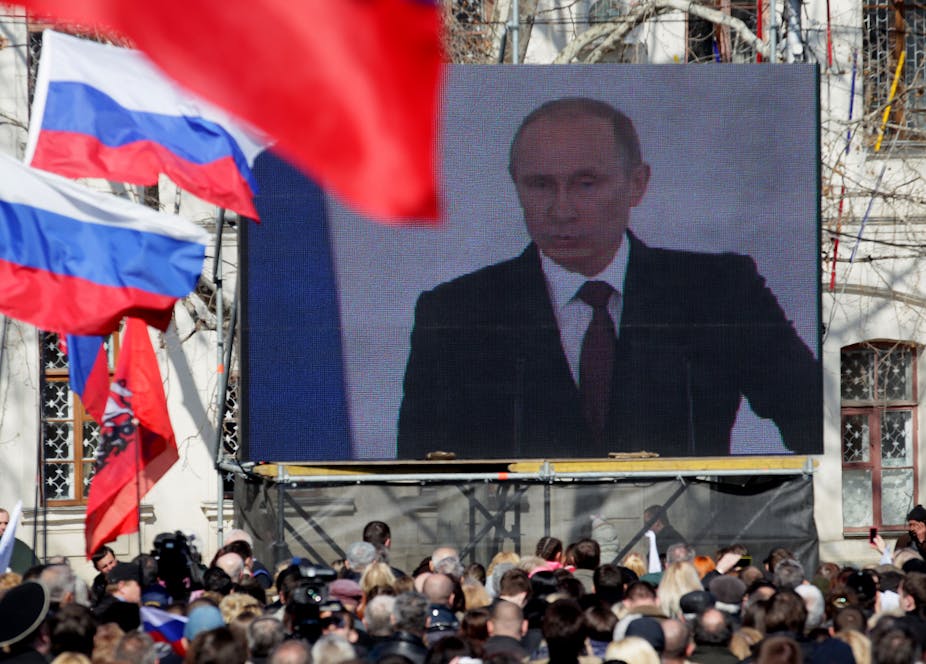Russian president, Vladimir Putin, has now apparently formalised the annexation by announcing two new laws that make Crimea and Sevastopol subjects of the Russian Federation and has signed a treaty to this effect with Crimea’s pro-Russian leaders.
This came despite the enactment of sanctions by the EU and the US and a clear indication that there was more to come if Russia annexed Crimea.
In line with their existing policy and previous diplomatic gambits, Western leaders have denounced the move as illegal and Washington has imposed additional sanctions.
The sense of a new Cold War with Russia is undeniable, not least from the tone of Putin’s speech, blaming the West for developments in Ukraine and forcing Russia’s hand in annexing the peninsula. But by acting so quickly and going, quite literally, beyond the point of no return, Putin has very much squandered whatever last chance for a diplomatic solution to the crisis there may have been.
Yesterday’s developments in the crisis still left a slim chance for a diplomatic solution. Putin recognised Crimea as a sovereign and independent state. The announcement of his address to the two houses of the Russian parliament to cover Crimea’s request to join the Russian Federation still left the possibility of face-saving compromise. The conclusions of the EU’s Foreign Affairs Council on Monday urged “the Russian Federation not to take steps to annex Crimea "in violation of international law” and to avoid further escalation through “constructive dialogue with all sides”.
The “peace treaty” between Russia and Ukraine, meant to allow Ukrainian armed forces in Crimea to exit and enter their bases freely and to replenish supplies, has entered into force and is to last initially until March 21. This now looks more likely to offer an exit strategy for Ukrainian forces from Crimea. Anything else would be equivalent to political suicide and may pave the way for further Russian inroads into Ukrainian territory.

Despite the Ukrainian parliament’s vote to allocate some US$600m to the defence budget and to mobilise 40,000 troops over the next three months, Ukraine is no match for Russia and any military escalation would be counter-productive. None of this bodes well at all, especially as there is an increasing danger now that local tensions may escalate and quickly spiral out of control into military hostilities that still are in no-one’s interest.
When Russia recognised Abkhazia and South Ossetia in 2008 after a brief war, there was similar talk of a new Cold War. Shortly afterwards, however, the US attempted a “reset” of its relations with Russia. This has clearly not worked and it is unlikely that we are heading anywhere but a new ice age, reminiscent of the darker periods of the Cold War.
Game over for Crimea
The battle over Crimea is clearly lost and there are still question marks over whether this will be the end of Russia’s overall campaign to reassert its great power status and hegemony in the former Soviet Union.
While never obviously in the category of “frozen conflicts”, the pattern of Russian policy towards Georgia in 2008 and now Ukraine 2014, does not bode well for the Transnistrian conflict in Moldova where the dynamics of geopolitical competition between Moscow and Brussels, albeit less intense, have been similar to Ukraine.
It would be foolish to assume that Moscow does not have plans and designs for Transnistria as well, and possibly for majority-Russian areas in Latvia and Estonia. And a foreign policy “success” like the one Putin has just had, may well embolden further Russian moves; the only hope is that the West will be better prepared for a possible next round of conflict with the Kremlin.
This is an updated version of an article that was originally written ahead of Vladimir Putin’s speech.

